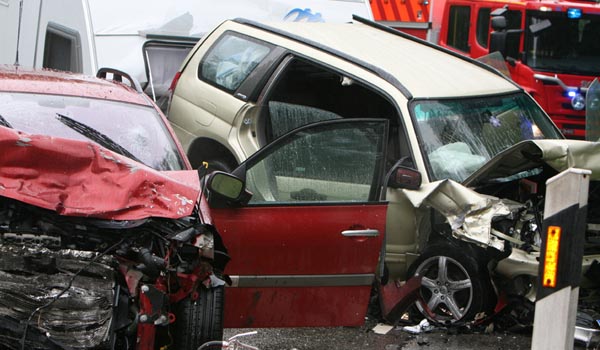Auto Injuries: A 'Winnable' Public Health Battle?

This is the sixth in a six-part MyHealthNewsDaily series examining the problems and solutions related to six "winnable battles" in public health, as recently announced by the U.S. Centers for Disease Control and Prevention.
Even with recent advances in safety and increases in drivers' compliance with the rules of the road, traffic crashes are still the leading killer of Americans under age 35. That's why a record-breaking decrease in fatalities last year offers little comfort to industry officials, who say their efforts will continue until casualties are a thing of the past.
Selected as one of six "winnable battles" by the Centers for Disease Control and Prevention (CDC), auto injuries are not always viewed as a public health problem like obesity and smoking, experts say. They welcome the prominence of the CDC's recent designation, which they hope will heighten people's awareness of their responsibility to drive unimpaired and undistracted.
About 34,000 Americans died on the road in 2009, the lowest number since 1950, according to the National Highway Traffic Safety Administration (NHTSA). An additional 2.2 million were injured, a 5.5 percent decline since 2008.
"We're talking about a disease of mobility and an epidemic of car crashes," said Peter Kissinger, president and CEO of the AAA Foundation for Traffic Safety. "We're losing someone about every 15 minutes. That's an outrage but people aren't outraged."
What it would take to win this public health battle
The biggest problem is not a lack of seatbelt use, which reached a record 85 percent compliance nationwide last year, nor is it technology, which has made vehicle interiors safer and cars "smarter" in their crash-avoidance capabilities.
Get the world’s most fascinating discoveries delivered straight to your inbox.
What's to blame, Kissinger said, is the "culture of complacency" that tacitly approves behaviors such as texting while driving, and prevents highway deaths from dropping further. And drunken driving, targeted for decades by citizen and policy groups, still accounts for one-third of all annual traffic deaths, according to the NHTSA.
"We've gone, in some ways, pretty much as far as we can go," said Bernie Fette, senior research specialist for the Center for Transportation Safety at Texas Transportation Institute. "If we limit ourselves to solutions in engineering and enforcement, we think the improvement (in casualties) is going to be smaller from year to year. So we have to change the way we think about driving our driving safety culture."
"You can fill a 747 with kids and crash one every week for an entire year, and get a number very similar in magnitude to the number who die every year in cars," Fette said. "Because it's spread out over the year, people become complacent. In reality, it doesn't have to be this way."
U.S. Secretary of Transportation Ray LaHood is considering a ban on all phone use in cars. The campaign he has led against texting and making calls while driving has been a major influence on restrictions in 30 states, according to the NHTSA. In late September, he kicked off the 2010 national Distracted Driving Summit by announcing new anti-distraction regulations for commercial drivers.
"We know the vast majority of fatalities and injuries are related to personal behavior," said Ellen Martin, an NHTSA spokeswoman. "Traffic crashes are not accidents many, many fatalities and injuries can be prevented."
More than 56 percent of all highway fatalities over the last five years are associated with aggressive driving, primarily in the form of speeding, Kissinger said. This is another behavior that must be eradicated in order to win the battle against auto injuries.
Is this battle winnable?
In determining what constitutes a victory in an inherently risky activity such as driving, industry officials take a hard line on both the public's responsibility and their own.
"This is absolutely winnable," Kissinger said. "We were reluctant to set bold goals, because we thought they were a bit of a stretch. But the point of changing culture is reframing the debate. One death is unacceptable, and it should be unacceptable to all of us."
"The 'win' is the day we can eliminate this epidemic," Martin said. "We're never going to be satisfied with people dying and getting injured on the road. We're moving in the right direction, but we're not going to stop."



